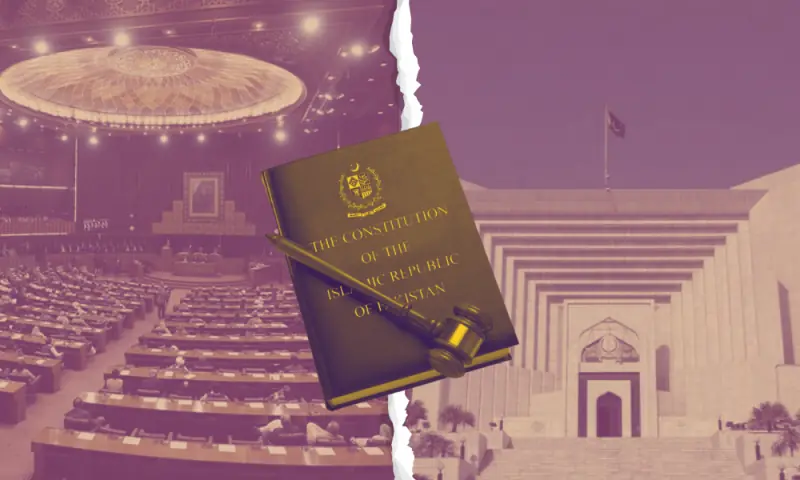The fight against the 26th and 27th Amendments is a fight for every Pakistani’s right to justice. It is not a fight to protect the judiciary for its own sake.
Listen to article 1x 1.2x 1.5x
After five days of heated debate, opposition protests, and last-minute revisions, the 27th Constitutional Amendment Bill was passed by Parliament on Thursday. A swift and subsequent signature by the head of state, and it is now a reality.
With this, the separation of powers and basic structure established by the 1973 Constitution of Pakistan — which envisioned an independent judiciary and armed forces subservient to the civilian dispensation — now stands terminated. The irony isn’t lost here that instead of the military, an independent judiciary has been amended away into a subservient department of the executive branch.
Two senior judges of the Supreme Court of Pakistan, both former chief justices of their respective provincial high courts, and one who should have been the incumbent Chief Justice of Pakistan, have tendered their resignations on grounds of complete judicial capture and constitutional distortion in the wake of the 27th Amendment. More resignations from independent judges are expected.
All of this has been achieved by a parliament that is widely perceived to be unrepresentative of the polity.
Much has been written and said in the past few days condemning the 27th Amendment and calling it the darkest chapter in Pakistan’s constitutional and legal history. Funeral rites referenced and obituaries have been written for the Supreme Court, in some cases by those who actively abetted this murder. At the same time, the military leadership has been able to secure constitutional and legal cover for itself that previous dictators and hybrid regimes, of which Pakistan has had many, have only dreamt of.
What is the 27th Amendment?
The amendment makes significant changes to the judicial system, the military’s chain of command and grants sweeping immunities to government officials.
A Federal Constitutional Court (FCC) has been established as the apex court in Pakistan, while the Supreme Court has been reduced to a final appellate court for civil and criminal matters. All matters of a constitutional nature, including those involving disputes between provincial and federal governments, public interest and the enforcement of fundamental rights of the people, will be hear
Continue Reading on Dawn
This preview shows approximately 15% of the article. Read the full story on the publisher's website to support quality journalism.
